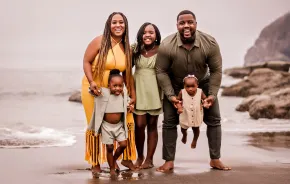 This year’s general election presents voters with stark choices on issues that significantly impact the health and welfare of families. Taxes, school choice, the definition of marriage, women’s reproductive rights and the legalization of marijuana hang in the balance.
This year’s general election presents voters with stark choices on issues that significantly impact the health and welfare of families. Taxes, school choice, the definition of marriage, women’s reproductive rights and the legalization of marijuana hang in the balance.
The stakes are especially high in this state. Besides helping to pick a president, Washington voters will choose a governor and decide the fate of several controversial ballot measures when they go to the polls on Nov. 6.
Many of the things that matter most to parents and kids — household budgets, personal values, educational opportunities — will be shaped by election outcomes. Here’s a closer look at what’s at stake, starting with education.
Charter schools
If it’s time to pick a president, it also must be time to vote on a charter schools initiative. This marks the fourth time in the last five presidential elections that a charter school measure has been on the Washington ballot. The only time it was absent was in 2008.
Initiative 1240 would allow the use of public funds to create 40 charter schools around the state over a five-year period. Washington is one of only nine states without charter school legislation. Charter schools are independent schools managed by approved nonprofit organizations. They are free, open to all students and receive funding based on student enrollment, just like traditional public schools.
Proponents — including Bill Gates and Paul Allen — cite the flexibility of charter schools, which must meet the same academic standards as other public schools, but are free from some of the regulations. The increased autonomy makes charter schools better at tailoring learning experiences for students who may be struggling in traditional schools, supporters say. They also argue that charter schools drive improvement in all schools by giving parents and students a choice and creating competition.
Opponents — including the state teachers union and the state PTA — say charter schools would drain money from existing public schools at a time when school funding has been cut dramatically. In addition, they argue that charter schools would erode local control by opening the door to out-of-state operators. They also point out that charter schools would serve only a tiny fraction of the state’s students. With attendance determined by lottery, there’s no way to guarantee that the children who are struggling in traditional schools would get in.
The “No on 1240” campaign (and on Twitter) argues, among other points, that 1240 “is a poorly written and vague document that has no guarantees to help at-risk students, has language that would force school districts to sell public buildings for less than they are worth and would allow approved charter operators to take over any school, failing or not, with a simple majority of signatures from parents OR teachers.”
From the “Yes on 1240” campaign (and on Twitter): “Our current public school system is working well for many students, but many others are struggling and at risk of dropping out. There are still far too many students in our public schools who are falling through the cracks. Initiative 1240 is modeled on the most successful charter school laws so that we can bring the best of what works in other states to Washington.”
The Republican candidate for governor, Attorney General Rob McKenna, supports the charter school initiative. His Democratic opponent, former U.S. Rep. Jay Inslee, opposes it. The charter school movement will have a friend in the White House no matter who is elected, as President Barack Obama, a Democrat, and former Massachusetts governor Mitt Romney, a Republican, both embrace the concept. One big difference: Romney wants to make federal funding for disabled and impoverished children portable, meaning the funding follows the student to whatever school they choose to attend — including charter schools and private schools.
K–12 funding
The state Supreme Court ruled earlier this year that Washington must do more to fund public schools. McKenna and Inslee say they would boost K–12 funding by $1 billion by squeezing other programs and growing the economy — not raising taxes.
That’s also how they propose to increase support for higher education and make college more affordable. Inslee vows to hold the line against further tuition hikes. McKenna’s goal is to restore a 50/50 balance between college costs covered by the state and what students and families pay.
Inslee and McKenna agree that K–12 teacher evaluations — including student test scores — should play a role in personnel decisions, such as layoffs. However, McKenna goes a step further by calling for teacher pay to reflect performance, not just seniority and credentials.
The federal No Child Left Behind law has become a political lightning rod since former President George Bush signed it into law in 2001. No Child Left Behind ties federal funding to standardized testing and prescribes a series of steps that poorly performing schools must take or eventually risk being closed. Amid criticism that the law puts too much emphasis on standardized testing and sets unrealistic targets, Obama has granted waivers to 32 states — Washington is one of them — provided they meet certain criteria.
Many of the criteria for receiving waivers, such as improving low-performing schools and using test scores as part of teacher and principal evaluations, overlap with the selection criteria for the president’s Race to the Top program. With federal grants as a carrot, Race to the Top encourages states to pursue education reform. Washington’s application for $250 million in K–12 grant money failed as Race to the Top’s point system heavily rewarded states with charter schools, and Washington currently doesn’t allow them. However, the state did receive $60 million for early learning initiatives, such as measuring how ready kids are for kindergarten and developing a quality rating system for preschools.
Romney would reform No Child Left Behind by doing away with the prescribed steps for improving poorly performing schools and replacing them with public report cards showing every school’s progress. During the course of his campaign, Romney has said he agrees with some of Race to the Top’s overall goals, such as encouraging school choice and using test scores in teacher and principal evaluations.
Romney and Obama are sharply divided over the role of the federal government in making college more affordable, including the future of Pell Grants for low-income college students. Romney believes the easy availability of federal subsidies such as Pell Grants helps drive rising tuition. His running mate, U.S. Rep. Paul Ryan of Wisconsin, is the author of a budget plan — endorsed in principle by Romney — that would tighten eligibility for Pell Grants and cap the maximum annual amount at $5,550. Obama, who expanded the Pell Grant program during his first term, would maintain existing eligibility criteria and continue adjusting the maximum amount to reflect the rate of inflation.
The economy
The economy is no longer in free fall, but the sluggish recovery is Obama’s albatross. He will likely face the highest unemployment rate on Election Day of any president since Franklin Roosevelt — not to mention a mounting national debt. As September began, the unemployment rate was 8.3 percent, and the national debt was $16 trillion. The flip side to Obama’s lack of progress is that Romney is a member of the party that occupied the White House when the economy’s slide began.
The Bush-era tax cuts are the economic red meat in the Obama-Romney race. They’re due to expire in 2013, and Congress is stalemated along party lines. The Democrats and Obama would let them expire for the “wealthy”: individuals making more than $200,000 and couples making more than $250,000. The Republicans and Romney would extend them for everyone. If neither side blinks and the tax cuts expire across the board, the average middle-income family will pay $1,500 more in taxes, according to the Tax Foundation.
Obama wants to hike the capital gains tax for the wealthy to 20 percent from the current rate of 15 percent. And he supports the so-called Buffet rule — named for investor Warren Buffet — which would require households making $1 million to pay at least 30 percent of their income in taxes.
Romney wants to cut all individual tax rates by 20 percent, which reduces the top rate to 28 percent from 35 percent. He would eliminate the capital gains tax for individuals making less than $200,000. The rate would remain at 15 percent for those making more than $200,000.
Taxes are not a defining issue in the governor’s race — neither candidate proposes to raise them — but Inslee and McKenna differ on Initiative 1185. McKenna is for it, and Inslee is against it. The measure would renew an existing requirement that all tax increases proposed by the Legislature receive two-thirds approval rather than a simple majority. In addition, any new or increased state fees would have to be approved by a simple majority of the Legislature.
In the first gubernatorial debate, The Seattle Times quoted Inslee as arguing, “It is a principle of democracy that we have one person, one vote.” Requiring two-thirds approval of taxes and fees would give opponents of taxes and fees “one and a half votes,” he said.
On the other hand, voters have approved the supermajority initiative multiple times in the past, including two years ago. Charles McCray, McKenna’s communications director, says in campaign materials, “Washington has a proud tradition of direct democracy, and Rob believes that voters should have the ability to control government directly when they feel they have been shut out by those who run Olympia.”
Social issues
Inslee and McKenna will get another chance to cancel each other’s votes when they cast ballots on Referendum 74, the final word on same-sex marriage in Washington. If approved, the measure will uphold a new law allowing same-sex marriage passed by the Legislature and signed by the governor earlier this year. If rejected, the law will be overturned.
Inslee plans to vote yes to support the new law. McKenna, who opposes it, plans to vote no. Inslee has called equality for gay couples a “quintessential Washington value.” McKenna has stated that he simply believes that “marriage is between a man and a woman.” He does, however, support the state’s current domestic partnership law that gives domestic partners all state-granted rights of marriage. McKenna voted to support the law when it was challenged by a referendum in 2009. McKenna has also said that he will support and uphold the decision of voters this fall, whatever it may be.
Obama once opposed federal recognition of same sex-marriage, but now supports gay marriage and wants to repeal the Defense of Marriage Act. The act defines marriage as a legal union between a man and a woman for all federal purposes, such as government employee benefits and filing joint tax returns.
Romney supports the Defense of Marriage Act and advocates amending the Constitution to define marriage as between a man and a woman. Although it’s not certain how such an amendment would affect civil unions, Romney opposes “everything but marriage” domestic partnerships, such as those allowed under Washington law.
Obama and Romney are similarly divided on abortion. Obama supports a woman’s right to choose, while Romney — who previously called himself pro-choice — now opposes abortion except in cases of rape or incest or if the mother’s life is in danger. Romney also wants the Supreme Court to overturn Roe v. Wade so states can decide the legality of abortion for themselves. And he has vowed to eliminate federal funding for Planned Parenthood, because it provides abortions. Inslee and McKenna both support a woman’s right to choose.
The Affordable Care Act — aka Obamacare — requires insurance companies to fully cover birth control as part of preventive health care for women. Romney opposes that requirement — along with virtually every other part of Obamacare — and is committed to repealing the law. In addition, Romney’s proposed budget cuts the Title X family planning program, which has provided funding for free birth control and preventive health services, such as cancer screenings, to low-income women since 1970.
None of that money can be used for abortions, but organizations that provide abortions, such as Planned Parenthood, receive Title X funding, which is why Romney wants to eliminate Title X. “[The] idea that we’re subsidizing an institution that provides abortion, in my view, is wrong,” Romney said during an interview with syndicated radio host Scott Hennen. “Planned Parenthood oughta stand on its own feet and should not get a government subsidy.”
Obama proposes maintaining existing Title X funding levels in his 2013 budget. Title X funds support a network of more than 4,500 community-based clinics, which include state and local health departments, independent clinics and nonprofit organizations such as Planned Parenthood. Eliminating the Title X program would save about $300 million a year, but would dramatically reduce access to health care services for the 5 million low-income women and men who receive services funded by the program.
While Inslee fully supports Obamacare, McKenna joined a group of Republican state attorneys general who asked the U.S. Supreme Court to overturn Obamacare. McKenna said he was mainly interested in overturning the individual mandate requiring everyone to buy health insurance. After the court upheld Obamacare, McKenna said he would abide by the ruling as governor.
Marijuana use
Washington voters will decide by ballot this fall whether to legalize marijuana for recreational use, and opinions are sharply divided. (Initiative 502 would legalize and tax the sale of marijuana for adults 21 and older.).
Most recently, the Children’s Alliance, a Seattle-based advocacy group with more than 100 social service agencies as members, declared its controversial support for the measure, stating that the status quo results in unfair enforcement of marijuana laws, especially among families of color. The Washington Association for Substance Abuse and Violence Prevention has opposed the measure, stating that marijuana is the top reason for youth in Washington to enter treatment and is linked to decreased educational performance.
Both candidates for governor say they oppose the legalization of marijuana for recreational use. However, Inslee supports deprioritizing marijuana prosecution. “I think law enforcement personnel can be used for different, more important law enforcement needs, frankly. So I’m looking for mechanisms to do that,” he says.
As Washington voters weigh the ballot measure this fall, the issue of medical marijuana will also be on their minds. Washington is among 16 states and the District of Columbia where medical marijuana is legal, although conflict between state and federal laws and other challenges have made it difficult for dispensaries (which are not explicitly permitted by the state law) to gain business legitimacy.
Some cities have banned the dispensaries; Seattle has had about 150 operating in neighborhoods throughout the city.
In late August, the federal government cracked down on some Seattle dispensaries located near schools or playgrounds, throwing many dispensary operators into doubt about how to continue operating, or whether they can.
Both candidates for governor say they support the availability of medical marijuana. And both claim they’d press for a federal reclassification of the substance, so that marijuana could be prescribed by a doctor and sold in a pharmacy.
Brad Broberg is an Auburn-based freelance writer.
ParentMap Web Editor Natalie Singer-Velush contributed to this story.











